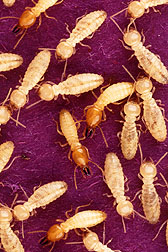This page has been archived and is being provided for reference purposes only. The page is no longer being updated, and therefore, links on the page may be invalid.
|
|
Hurricane Georges Reveals Smaller, Quieter Menace in New Orleans TreesBy Jan SuszkiwNovember 9, 1998 The glancing blow by Hurricane Georges that toppled 28 trees in New Orleans’ City Park in September revealed that most were infested by Formosan subterranean termites. Now scientists wonder just how many more trees at the 1,500-acre park harbor the tiny, ravenous pest? A post-storm survey revealed that 75 percent of the fallen trees—21 of 28—harbored the insect. Among the trees were oak, elm, palm, pine and cypress. Termite damage, say Agricultural Research Service scientists, probably weakened the trees enough that they couldn’t withstand the storm’s high, sustained winds. A direct hit might have felled many more. ARS is the U.S. Department of Agriculture’s chief scientific arm. The scientists, led by microbiologist Alan Lax, are based at ARS’ Southern Regional Center in New Orleans. They’re helping wage Operation Full Stop, a new national campaign to suppress the Formosan subterranean termite. In New Orleans alone, it costs city residents about $300 million annually in repairs and controls. Researchers hope to undermine the pest by exploiting weaknesses in its chemical communication, nutrition and growth. They’re also helping conduct pilot studies with the New Orleans Mosquito and Termite Control Board and five state universities. Experts believe the termite entered the U.S. in military supply ships returning from the Pacific after World War II. Today it infests coastal regions of 13 states. Details on Operation Full Stop can be found on the World Wide Web at: /is/fullstop Operation Full Stop also was the cover story in a recent issue of ARS’ monthlyAgricultural Research magazine. The story also is on the web at: /is/AR/archive/oct98/form1098.htm Scientific contact: Alan Lax, ARS Formosan Subterranean Termite Research Unit, Southern Regional Research Center, New Orleans, La., phone (504) 286-4472, fax (504) 286-4419, alax@nola.srrc.usda.gov
|

![Hurricane Georges split tree weakened by Formosan subterranean termites. [Only a digital file is available for this image; no transparencies or prints.]](/ARSUserFiles/oc/graphics/photos/oct98/georges.jpg)
